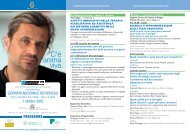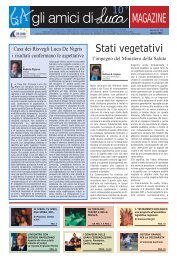You also want an ePaper? Increase the reach of your titles
YUMPU automatically turns print PDFs into web optimized ePapers that Google loves.
caratterizzante <strong>di</strong> una con<strong>di</strong>zione<br />
<strong>di</strong>chiarata a priori senza speranza<br />
e si alimenta quello che Fins<br />
(2003) ha in<strong>di</strong>cato come “nichilismo<br />
terapeutico”, per gli aspetti<br />
clinici, e “neglect syndrome” per<br />
l’attenzione de<strong>di</strong>cata alla ricerca.<br />
Kilner nel 1992 notava che il termine<br />
“vegetative state … invites<br />
inadequate treatment”; questo<br />
resta vero ancora oggi dopo 20<br />
anni. Ancora in troppi casi i<br />
pazienti in SV sono gestiti in<br />
modo meno che ottimale per la<br />
mancanza <strong>di</strong> una rete <strong>di</strong> eccellenza<br />
<strong>di</strong>ffusa <strong>di</strong> centri riabilitativi<br />
specializzati per il trattamento<br />
delle neuro<strong>di</strong>sabilità complesse:<br />
questo costituisce, <strong>di</strong> fatto, una<br />
forma <strong>di</strong> abbandono terapeutico.<br />
Deve essere affermato con forza<br />
il <strong>di</strong>ritto alla cura per tutti coloro<br />
che possono essere aiutati.<br />
Bibliografia<br />
1. Andrews K, Murphy L, Munday R, Littlewood<br />
C. Mis<strong>di</strong>agnosis of the vegetative<br />
state: retrospective study in a<br />
rehabilitation unit. BMJ 1996;<br />
313:13–16.<br />
2. Bekinschtein TA, Shalom DE, Forcato<br />
C, Herrera M, Coleman MR, Manes<br />
FF, Sigman M. Classical con<strong>di</strong>tioning<br />
in the vegetative and minimally conscious<br />
state. Nature Neuroscience<br />
2009: 12(10),1343-1349<br />
3. Boly M, Faymonville ME, et al. Au<strong>di</strong>tory<br />
Processing in Severely Brain<br />
Injured Patients. Arch Neurol. 2004;<br />
61:233-238;<br />
4. Borthwick CJ, Crossley R. Permanent<br />
Vegetative State: Usefulness and limits<br />
of a prognostic definition. NeuroRehabilitation.<br />
2004; 19: 381–389<br />
5. Chiambretto P, Guarnerio C. Vegetative<br />
state and over-treatment: what families<br />
think of it. G Ital Med Lav Ergon.<br />
2007; 29(1 Suppl A):A12-18.<br />
6. Childs NL, Mercer WN, Childs HW.<br />
Accuracy of <strong>di</strong>agnosis of persistent<br />
vegetative state. Neurology 1993;<br />
43:1465–7.<br />
7. Coleman MR, Davis MH et al. Towards<br />
the routine use of brain imaging to aid<br />
the clinical <strong>di</strong>agnosis of <strong>di</strong>sorders of<br />
consciousness. Brain 2009: 132;<br />
2541–2552<br />
8. Di H, Boly M, et al. Neuroimaging acti-<br />
30<br />
D O S S I E R<br />
vation stu<strong>di</strong>es in the vegetative state:<br />
pre<strong>di</strong>ctors of recovery? Clin Med<br />
2008; 8:502–508;<br />
9. Fins JJ. Brain Injury: The Vegetative<br />
and Minimally Conscious States. in<br />
From Birth to Death and Bench to<br />
Clinic: The Hastings Center Bioethics<br />
Briefing Book, ed. Mary Crowley<br />
(Garrison, NY: The Hastings Center,<br />
2008), 15-20.<br />
10. Fins JJ. Constructing an ethical stereotaxy<br />
for severe brain injury: balancing<br />
risks, benefits and access. Nat Rev<br />
Neurosci. 2003; 4:323-327<br />
11. Giacino JT, Kalmar K. The vegetative<br />
and minimally conscious states: a<br />
comparison of clinical features and<br />
functional outcome. J Head Trauma<br />
Rehabil 1997;12(4):36-51.<br />
12. Giacino JT. The vegetative and minimally<br />
conscious states: Consensusbased<br />
criteria for establishing <strong>di</strong>agnosis<br />
and prognosis. NeuroRehabilitation<br />
2004; 19: 293–298<br />
13. Hebuterne X, Bozzetti F, et al. Home<br />
enteral nutrition in adults: a European<br />
multicentre survey Clinical Nutrition<br />
2003; 22(3): 261–266<br />
14. Jennett B, Adams JH, Murray LS,<br />
Graham DI. Neuropathology in vegetative<br />
and severely <strong>di</strong>sabled patients<br />
after head injury. Neurology 2001;<br />
56:486–490<br />
15. Kotchoubey B, Lang S, et al. Information<br />
processing in severe <strong>di</strong>sorders of<br />
consciousness: Vegetative state and<br />
minimally conscious state. Clinical<br />
Neurophysiology 2005;<br />
116:2441–2453<br />
16. Krakau K, Omne-Ponten M, et al.<br />
Metabolism and nutrition in patients<br />
with moderate and severe traumatic<br />
brain injury: A systematic review<br />
Brain Injury. 2006; 20(4): 345–367<br />
17. Lammi MH, Smith VH, Tate RL, et al.<br />
The minimally conscious state and<br />
recovery potential: a follow-up study<br />
2 to 5 years after traumatic brain<br />
injury. Arch Phys Med Rehabil 2005;<br />
86:746–754.<br />
18. Laureys S, Faymonville ME, et al.<br />
Au<strong>di</strong>tory processing in the vegetative<br />
state. Brain. 2000;123:1589-1601.<br />
19. Laureys S, Faymonville ME, et al.<br />
Cortical processing of noxious<br />
somatosensory stimuli in the persistent<br />
vegetative state. Neuroimage.<br />
2002; 17:732-741<br />
20. Laureys S, Faymonville ME, et al.<br />
Restoration of thalamocortical connectivity<br />
after recovery from persistent<br />
vegetative state. THE LANCET<br />
2000; 355: 1790-1791<br />
21. Laureys S, Owen AM, Schiff ND.<br />
Brain function in coma, vegetative<br />
state, and related <strong>di</strong>sorders. Lancet<br />
Neurol 2004; 3: 537–546<br />
22. Laureys S. The neural correlate of<br />
(un)awareness:lessons from the vegetative<br />
state. TRENDS in Cognitive<br />
Sciences 2005; 9(12): 556-559<br />
23. Monti MM, Vanhaudenhuyse A, et al.<br />
Willful modulation of brain activity in<br />
<strong>di</strong>sorders of consciousness. N Engl J<br />
Med 2010; 362(7): 579-589<br />
24. National Health and Me<strong>di</strong>cal Research<br />
Council. Australian Government.<br />
Post-Coma Unresponsiveness (Vegetative<br />
State): A Clinical Framework<br />
for Diagnosis. 12/18/03.<br />
25. Owen AM., Coleman MR. et al<br />
Detecting awareness in the vegetative<br />
state. Science 2006; 313(5792): 1402.<br />
26. Plum F, Schiff N, Ribary U, Llinas R.<br />
Coor<strong>di</strong>nated expression in chronically<br />
unconscious persons. Phil.Trans. R.<br />
Soc. Lond. 1998; 353: 1929-1933.<br />
27. Province C. The vegetative state: Promoting<br />
greater clarity and improved<br />
treatment. Neuropsychological Rehabilitation.<br />
2005; 15 (3/4): 264–271<br />
28. Sancisi E, Battistini A, Di Stefano C.,<br />
Simoncini L, Simoncini L, Montagna<br />
P, Piperno R. Late recovery from posttraumatic<br />
vegetative state. Brain<br />
Injury 2009; 23(2):163-166<br />
29. Schiff ND. Bringing neuroimaging<br />
tools closer to <strong>di</strong>agnostic use in the<br />
severely injured brain. Brain 2007;<br />
130: 2482-2483<br />
30. Schnakers C. et al. Diagnostic accuracy<br />
of the vegetative and minimally<br />
conscious state: Clinical consensus<br />
versus standar<strong>di</strong>zed neurobehavioral<br />
assessment. BMC Neurology 2009;<br />
9:35<br />
31. Shewmon DA. A critical analysis of<br />
conceptual domains of the vegetative<br />
state: Sorting fact from fancy. NeuroRehabilitation.<br />
2004; 19: 343–347<br />
32. Shoenle PW, Witzke W. How vegetative<br />
is the vegetative state? Preserved<br />
semantic processing in VS patients –<br />
Evidence from N 400 event-related<br />
potentials. NeuroRehabilitation 2004;<br />
19: 329–334<br />
33. The Multi-Society Task Force on PVS.<br />
Me<strong>di</strong>cal aspects of the persistent vegetative<br />
state (first of two parts). N<br />
Engl J Med 1994; 330:1499–1508.<br />
(second of two parts). N Engl J Med<br />
1994; 330:1572–1579.<br />
34. Vanhaudenhuyse A, Schnakers C, Brédart<br />
S, Laureys S. Assessment of visual<br />
pursuit in post-comatose states: use<br />
a mirror. J. Neurol. Neurosurg. Psychiatry.<br />
2008 :79(2), 223<br />
35. Voss H.U., Ulu A. et al. Possible axonal<br />
regrowth in late recovery from the<br />
minimally conscious state. Journal of<br />
Clinical Investigation 2006; 116(7):<br />
1823–1825.





